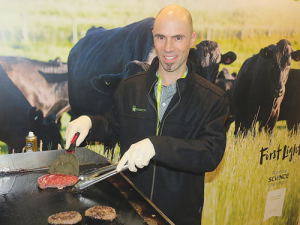NZ scientists make breakthrough in Facial Eczema research
A significant breakthrough in understanding facial eczema (FE) in livestock brings New Zealand closer to reducing the disease’s devastating impact on farmers, animals, and rural communities.
 AgResearch senior scientist Matthew Barnett serving up Waygu treats to the punters at this year’s National Fieldays.
AgResearch senior scientist Matthew Barnett serving up Waygu treats to the punters at this year’s National Fieldays.
A three-year research project to try to discover whether grass-fed Wagyu beef has significant health benefits is in its final stages.
The project, initiated by the Government, involves Firstlight Farms, which produces the Wagyu beef, AgResearch and Auckland University.
The object of the trial, says a Firstlight Farms founder Jason Ross, is to validate their assumptions that grass-fed Wagyu beef has more of the good fats than grain-fed beef, with consequent health benefits for consumers.
Ross says a healthy diet would contain a balance of Omega 3 and Omega 6. Grass-fed Wagyu beef has a higher proportion of Omega 3 than grain-reared meat, he says.
“The modern diet has a higher proportion of Omega 6 to Omega 3 because we have more grain or corn in our base diet than we did historically,” Ross told Rural News.
“You get Omega 3s from fish and grass-fed meat amongst other things. In grain-fed beef, the ratio of Omega 6 was significantly higher than Omega 3, whereas in the grass-fed Wagyu beef it was almost 1 for 1.”
Ross says having found out the composition of Omega 3 in Wagyu, the trial has now entered the final stage of seeing whether the grass-fed Wagyu can benefit human health.
“We are targeting the ‘at risk’ group – men aged 50 and older -- in our trial group. Three times a week we are giving them grass-fed Wagyu beef in various forms. We are trying to mimic their diet; so we are not giving them three burgers a week, but rather a steak and burger and other portions of grass-fed beef.
“At the same time, we are giving a similar number of people in the target group grain-fed beef and then taking blood samples to see if there is a difference to their health and, in particular, their cholesterol levels and heart condition.”
Ross says this is taking place at the Riddet Institute under strict research conditions.
A discovery that Wagyu beef is good for health would be good news.
“We wouldn’t have a sticker or claim put on the meat,” he says. “We just want to be reassured that we are doing the right thing.”
About 90% of Wagyu beef produced in NZ is exported, mainly to the US and Europe. It is also sold in about 100 NZ supermarkets.
Wagyu beef was on show at Fieldays last month with AgResearch running a public cooking demonstration and sampling.
Senior scientist Matthew Barnett says their research has shown the health benefits of grass-fed Wagyu beef, in particular the presence of beneficial fats not found in other meats.
This is not lost on consumers who “are now much more health aware,” Barnett says.
“And we know consumers in export markets are interested in health and in knowing that the food they eat is good for their health.
Firstlight agyu recently won a gold medal at Steak of Origin (retail brand) and another gold in London at the World Steak Challenge.
As New Zealand marks the United Nations’ International Year of the Woman Farmer 2026 (IYWF 2026), industry leaders are challenging the misconception that women only support farming.
Fonterra’s impending exit from the Australian dairy industry is a major event but the story doesn’t change too much for farmers.
Expect greater collaboration between Massey University’s school of Agriculture and Environment and Ireland’s leading agriculture university, the University College of Dublin (UCD), in the future.
A partnership between Torere Macadamias Ltd and the Riddet Institute aims to unlock value from macadamia nuts while growing the next generation of Māori agribusiness researchers.
A new partnership between Dairy Women’s Network (DWN) and NZAgbiz aims to make evidence-based calf rearing practices accessible to all farm teams.
Despite some trying circumstances recently, the cherry season looks set to emerge on top of things.